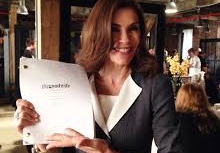I can remember my sister trying to teach me to read. I can see her, I can see the room, I can feel my anxiousness to get away, I can hear my mom saying okay, well, maybe that’s enough for today. I was slow to start and while I’m fuzzy now on the details of how it went at school, I know I was in a remedial reading class for a least a while. I know that because I can equally clearly see the room and the teacher.
Again, I’m shaky on details but I think it was that several of us who were below average reading ability were regularly taken off out of classes and into some other room to read. I’m sure of it, actually, because the thing I can see, the moment I can completely visualise is when the teacher thought I was pretending to read.
Whatever it was, however it happened, there was just one moment when suddenly I could read very well. I’m not certain I even realised it: I picture her asking me to read something aloud and instead of struggling as I presumably did up to then, I read it flawlessly. I read that flawlessly, I read the next piece she shoved under my nose and the next. I read and read and never went back to that remedial class again.
I don’t often tell people that but chiefly because I don’t often remember it. Reading is just part of everything I do, it’s part of everything I am. Only, I wanted to tell you this today because something happened this week. It’s something that I am having difficulty processing, I am struggling to get it into my skull. But then equally, I can’t seem to get it out of my head either.
I’m a best-selling author.
Seriously.
You’ve got to let me qualify that, you’ve got to let me try to whittle it down a bit. I’m a best-selling author of a non-fiction book, actually solely an ebook, and I’m a best-selling author only in its very, very specific niche. I’ll tell you: the book is called <a href=”http://amzn.to/1OdOCJx”>MacNN Pointers: Get More from Your Apple Software</a> and I co-wrote it with Charles Martin. We are best-selling authors of this collection of tutorials on how to use the software that comes with your iPhone, iPad, Mac and so on. We co-wrote it, I edited it and the book was proposed by Mike Wuerthele. He’s managing editor of MacNN.com, Chas is editor.
Within a few hours, certainly no more than a day of it being available, the book went to number 1 in its category on Apple’s iBooks Store in both the US and the UK. On Kindle, it was number 2 in the US and nowhere near as high in the UK – but high enough that Amazon listed it has a Hot Seller. Then at some point it became number 10 on Amazon for books in its category. That’s books, not ebooks. Number 10 in its category across both ebooks and physical books.
That speed isn’t just exciting, for me, it’s directly responsible for the best-selling status. For publishing has changed and not just in the fact that there are now ebooks. It’s changed in how I believe it used to be that the book that sold the most number of copies was the best-selling number 1. I don’t know that was the case but it sounds pretty reasonable. Today that is a factor but so is the speed of sales: something selling a dozen copies a minute will chart higher than something selling a dozen a week, even if the former only lasts for one minute.
So the fact that, for whatever reason, the book was immediately popular, that’s what took it into this status. I can tell you we’ve sold a couple of hundred copies so it’s not like we’re shirking.
I’m not thinking of numbers though. I’m certainly not thinking of the money: this is not something that will change my week let alone my life. I’m thinking instead of how this is like the time a proof copy of my first-ever book arrived. I held that book in my hand and I realised no one can ever take it away from me. Good or bad, I’d created that book and long after my death if any other writer wants to cover the same ground, their proposal will have to explain how my book can be bettered.
In much the same way, then, you can argue that best-seller status doesn’t mean what it used to, you can very well argue that it’s a bit different being a best-selling author in a non-fiction technology category than it is being a novelist on the New York Times charts. But you can’t take it away. No one can. I actually am a best-selling author.
I’m a little red-faced with excitement yet also pale: a slow-starting reader, a remedial-class reader, what one pixel changed in my life or my head that turned me into a writer? I am unemployable in any other job: I think a lot about what would’ve happened if I’d not found this in me.
I’m also uncomfortable being proud of this. I’m only telling you, right? And any publisher I ever pitch to, naturally. I’m modest but I’m not stupid.
No, sorry, modesty is wrong. I am British, that is how I feel about it, but I’m also proud and so I should be. I didn’t particularly aim to be a best-selling author, the lifetime ambition has been just to write and keep writing, but now it’s here I am and I should be proud.
I got to this the long way around, I got to it through stubborn persistence. So yes, I’ve been pig-headed for a long time and maybe now I can spend a minute or two being big-headed instead.
